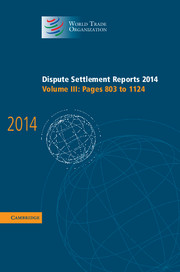China - Measures related to the Exportation of Rare Earths, Tungsten, and Molybdenum (WT/DS431, WT/DS432, WT/DS433): Reports of the Appellate Body
Published online by Cambridge University Press: 28 September 2017
Summary
INTRODUCTION
The United States and China each appeals certain issues of law and legal interpretations developed in the Panel Report, China – Measures Related to the Exportation of Rare Earths, Tungsten, and Molybdenum, WT/DS431/R (US Panel Report). China also appeals certain issues of law and legal interpretations developed in the Panel Report, China – Measures Related to the Exportation of Rare Earths, Tungsten, and Molybdenum, WT/DS432/R (EU Panel Report) and in the Panel Report, China – Measures Related to the Exportation of Rare Earths, Tungsten, and Molybdenum, WT/DS433/R (Japan Panel Report). The Panel issued its findings in the form of a single document constituting three separate Panel Reports, which we refer to, collectively, as the “Panel Reports”. The Panel was established to consider complaints by the United States, the European Union, and Japan (the complainants) with respect to China's use of export duties and export quotas on various forms of rare earths, tungsten, and molybdenum.
Panel Proceedings
The complainants challenged China's imposition of export duties on 58 rare earth products, 15 tungsten products, and 9 molybdenum products. The complainants’ challenges regarding export quotas related to 75 rare earth products, 14 tungsten products, and 9 molybdenum products. Rare earths, tungsten, and molybdenum are naturally occurring minerals found in various mined ores. The products subject to the challenged measures consist of both the naturally occurring minerals, as well as a number of intermediate products, that is, materials that have undergone some initial processing, for example, into concentrates, oxides, salts, and metals. Generally speaking, the downstream products in which rare earths, tungsten, and molybdenum are ultimately used are not covered by the measures at issue in these disputes. Further details about the products at issue in these disputes may be found in paragraphs 2.2 to 2.7 of the Panel Reports and paragraphs 4.10 through 4.12 of these Reports.
The complainants identified a number of legal instruments in connection with their claims, including Chinese framework legislation, implementing regulations, other applicable laws, and specific annual measures. The European Union and Japan also made claims in respect of replacement measures and renewal measures, while the United States made claims in respect of “implementing measures in force to date”.
- Type
- Chapter
- Information
- Dispute Settlement Reports 2014 , pp. 805 - 1098Publisher: Cambridge University PressPrint publication year: 2016
- 2
- Cited by

